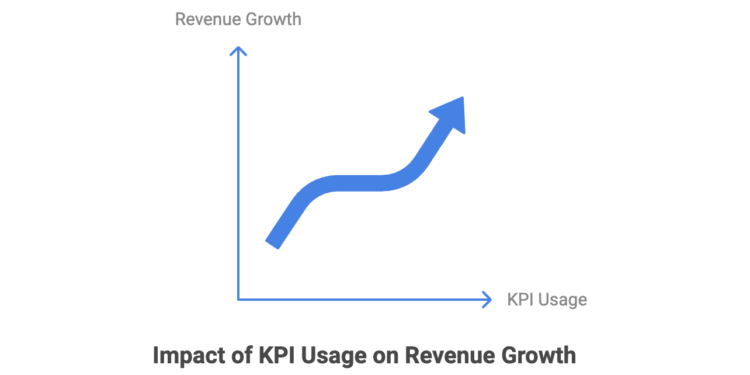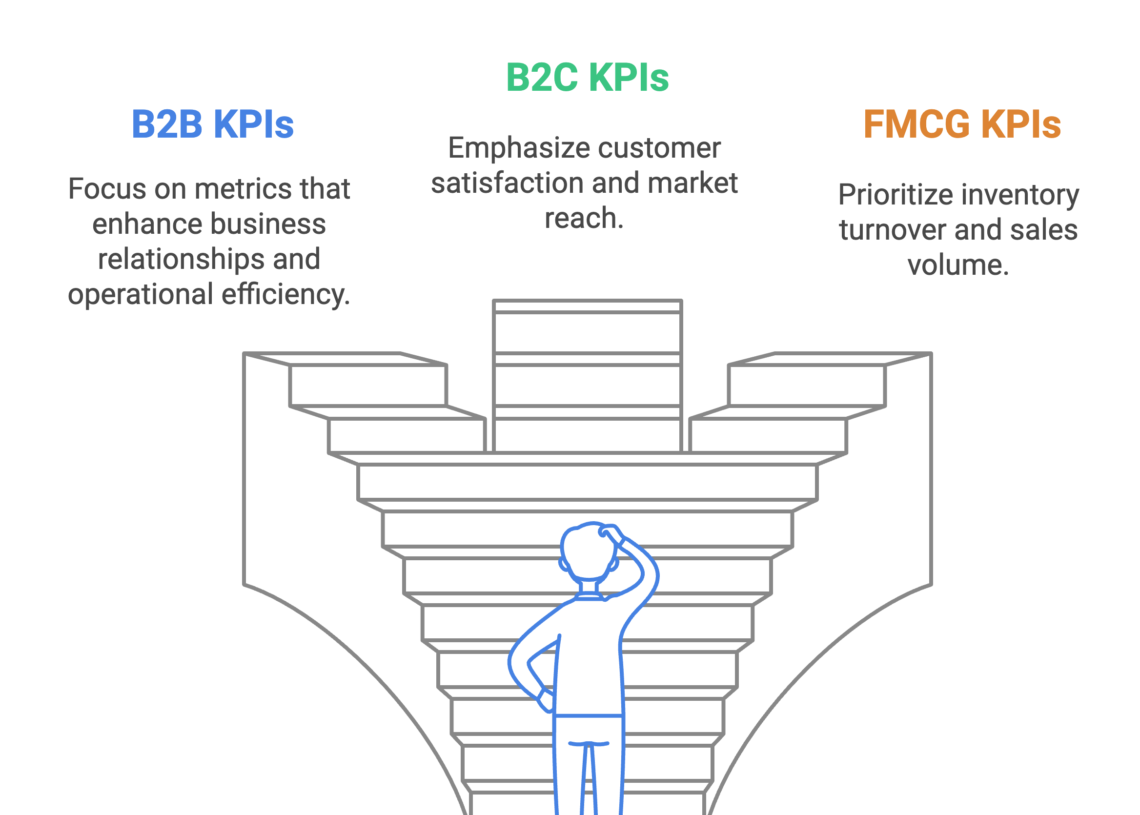In the bustling, data-rich landscape of today’s business world, the companies that truly excel are the ones that focus on measuring what truly matters. For Nigerian businesses, navigating the complexities of diverse consumer behaviours and unique market dynamics can be a game-changer. The right Key Performance Indicators (KPIs) can mean the difference between soaring growth and frustrating stagnation. KPIs are not just mere numbers; they are the guiding stars that lead businesses toward their goals. In this blog, we’ll explore how Nigerian companies can uncover the most impactful marketing KPIs tailored to their distinct environments, driving results that resonate and inspire. Join us on this journey to unlock the potential that lies in strategic measurement!
What Are Marketing KPIs and Why Do They Matter?
According to a recent survey from the Small Business Administration, businesses that consistently utilize KPIs see average revenue growth of 33%, illustrating how vital these indicators are in steering decision-making and operational strategies.
 Marketing KPIs are powerful tools that provide measurable insights into how well your marketing efforts align with your business goals. They track everything from website traffic to customer retention, giving you a clear picture of what’s driving success and what might need a little extra attention. For Nigerian businesses navigating a competitive and sometimes unpredictable landscape, keeping an eye on these KPIs can be a game-changer. They offer the clarity and focus needed to fine-tune strategies and adapt quickly, ensuring you’re always ahead of the curve.
Marketing KPIs are powerful tools that provide measurable insights into how well your marketing efforts align with your business goals. They track everything from website traffic to customer retention, giving you a clear picture of what’s driving success and what might need a little extra attention. For Nigerian businesses navigating a competitive and sometimes unpredictable landscape, keeping an eye on these KPIs can be a game-changer. They offer the clarity and focus needed to fine-tune strategies and adapt quickly, ensuring you’re always ahead of the curve.
Understanding the Nigerian Market Context
The Nigerian market is rich with opportunities but also layered with complexities. Navigating the business landscape can be tricky, especially with hurdles like limited infrastructure, regional differences, and varying consumer behaviours at play. It’s essential for companies to strategically select KPIs that resonate with their unique audiences and markets. Take fashion brands, for instance—they thrive on social media engagement to connect with younger consumers. Meanwhile, fast-moving consumer goods (FMCG) companies tend to focus on distribution and sales metrics.
Tailoring these key performance indicators is crucial for achieving success in such a diverse environment!
The Right KPIs for B2B, B2C, and FMCG Businesses in Nigeria.
Understanding the right Key Performance Indicators (KPIs) for your business is like finding a compass in a dense forest—it guides you toward success. Whether you’re a B2B, B2C, or FMCG brand in Nigeria, choosing and tracking the right KPIs is crucial to navigating challenges, measuring progress, and maximizing growth opportunities.
KPIs for B2B Businesses:
B2B companies rely on Key Performance Indicators (KPIs) to evaluate the success of their marketing efforts. Their success often lies in building strong relationships and nurturing leads over time. Tracking KPIs that focus on efficiency, conversion, and retention ensures businesses go beyond generating leads to creating loyal, long-term customers.
Essential KPIs for Nigerian B2B Businesses
- Website Traffic: Monitors the number of visitors, revealing how effective your campaigns are at driving awareness.
- Website Conversions by Source: Tracks the origin of your website conversions to identify the most effective channels. The number of conversions (e.g., form fills, demo requests) segmented by traffic source (organic, paid, referral).
- Marketing Qualified Leads (MQLs): Measures leads that meet predefined criteria for marketing engagement, signalling potential value.
- Cost Per Lead (CPL): Evaluate the cost-effectiveness of your campaigns in generating new leads.
- Customer Lifetime Value (CLV): Calculates the total revenue a business can expect from a customer over their engagement period.
- Return on Marketing Investment (ROMI): Assesses the profitability of marketing campaigns by comparing revenue to marketing expenses.
KPIs for B2C Businesses:
For B2C businesses, the focus is on high-volume sales, strong brand presence, and exceptional customer experiences. KPIs here revolve around capturing attention, driving conversions, and fostering repeat purchases. The Nigeria B2C E-commerce Market Databook Report 2023 highlights the impressive growth trajectory of the Nigerian e-commerce sector, projected to reach $18.7 billion by 2027. This growth presents opportunities for B2C companies to leverage key performance indicators (KPIs) to optimize their marketing strategies. Yahoo Finance
Essential KPIs for Nigerian B2C Businesses
- Awareness and Reach Metrics: In Nigeria’s dynamic digital space, metrics like social media impressions and website traffic are essential for tracking how well your brand is reaching potential customers.
Example: An online fashion store might measure Instagram’s reach to see how well their new collection is gaining traction.
- Engagement Metrics: Metrics like bounce rate and time spent on the site show how effectively you’re keeping visitors engaged with your content or product offerings.
- Conversion Metrics: The ultimate goal of B2C marketing is to drive sales. KPIs like conversion rate and cart abandonment rate provide insights into what’s working and what needs fixing.
- Customer Loyalty Metrics: Retaining customers is cheaper than acquiring new ones. Metrics like repeat purchase rate and net promoter score (NPS) help track customer satisfaction and advocacy.
KPIs for FMCG Brands:
The FMCG sector in Africa has been experiencing remarkable growth. In 2022, the market was valued at approximately $400 billion and is projected to grow annually by 5% to 7% over the next five years. Inflation has also played a significant role in this upward trend, with the sector’s value increasing by 38.5% in Q1 2023 alone. This rapid expansion presents significant opportunities for brands looking to penetrate or strengthen their presence in the region.
To capitalize on this growth, FMCG brands must focus on the right KPIs to ensure they meet the demands of Africa’s fast-evolving consumer markets.
1. Sales Growth: This KPI measures the percentage increase in sales over a specific period. Sales growth reflects the overall performance and market demand for FMCG products.
Example: An FMCG company like Dangote tracks the growth in monthly sales of its packaged food products to measure market expansion.
2. Market Share: This KPI indicates the company’s portion of total industry sales. This helps gauge competitive positioning within the FMCG sector.
Example: Nestlé Nigeria monitors market share in categories like infant nutrition and beverages.
3. Distribution Reach: This KPI measures the percentage of retail outlets where products are available. Distribution is critical for FMCG as availability drives sales.
4. Brand Awareness: This KPI measures how familiar consumers are with a brand. High brand awareness translates to stronger customer loyalty and higher sales.
Example: Guinness Nigeria uses social media impressions and survey data to track awareness of new beverage launches.
Key Metric: Social media reach, ad impressions, or unaided brand recall.
5. Stock Turnover Rate (Inventory Turnover): This KPI evaluates how quickly inventory is sold and replaced. High turnover indicates efficient sales, while low turnover may signal overstocking or poor sales.
Example: FMCG brands like PZ Cussons track the turnover of seasonal products like body creams.
6. Customer Retention Rate: This KPI measures the percentage of customers returning for repeat purchases. Retained customers are often more profitable than new customers.
How to Choose the Right KPIs for Your Business
Regardless of your business model, the key to KPI success lies in alignment with your goals:
- Define Clear Objectives: Are you aiming for brand awareness, lead generation, or customer retention?
- Understand Your Market: Nigerian businesses must consider regional disparities, digital adoption, and consumer preferences.
- Prioritize Actionable Metrics: Focus on KPIs that provide insights you can act on immediately.
- Leverage Analytics Tools: Use platforms like Google Analytics or tailored dashboards to track and interpret data.
Common Mistakes to Avoid
- Choosing too many KPIs: Tracking everything dilutes focus. Instead, focus on a few critical metrics.
- Focusing on vanity metrics: While likes and shares are nice, they don’t always translate into business growth.
- Ignoring data accuracy: Poor data collection leads to flawed insights. Invest in reliable data systems.
- Overlooking market dynamics: Nigerian businesses must consider local consumer preferences and regional disparities.
Practical Tips for Nigerian Businesses
- Start with a small set of KPIs and expand as your data analytics capabilities grow.
- Review and update your KPIs regularly to reflect market changes.
- Invest in training for staff to maximize the value of data analytics tools.
How Marketing Analytics Africa Can Help
At Marketing Analytics Africa (MAA), we specialize in empowering Nigerian businesses to make data-driven decisions. From helping B2B companies streamline lead generation to assisting FMCG brands with optimizing distribution metrics, we provide tailored solutions to meet your unique needs.
Our team of experts helps you select the right KPIs, track performance accurately, and turn data into actionable strategies. Whether you’re a startup or an established business, we’re here to help you unlock your growth potential.
Ready to elevate your business with the right KPIs? Contact us at Marketing Analytics Africa today, and let’s build a data-driven future together!





